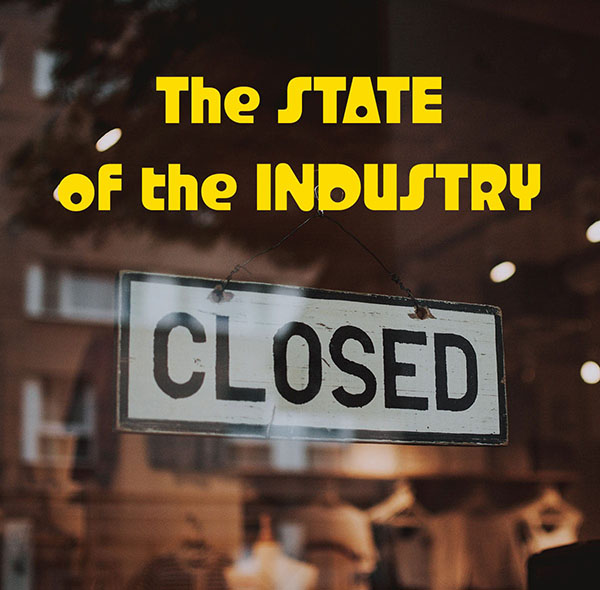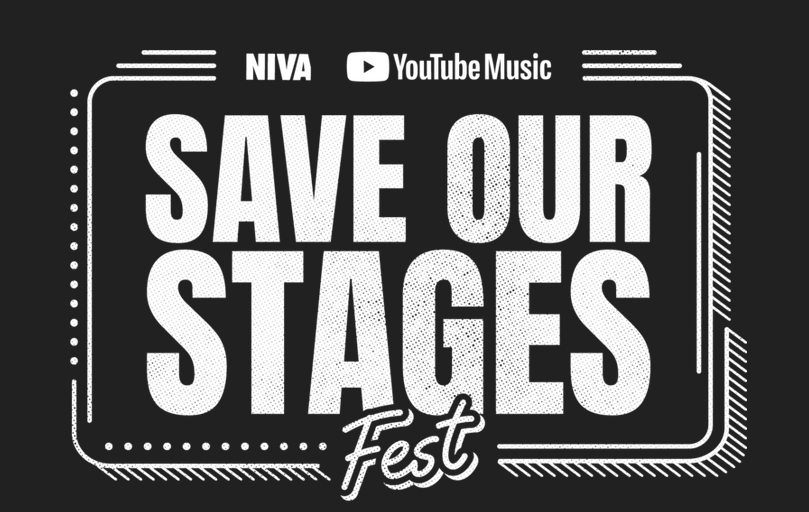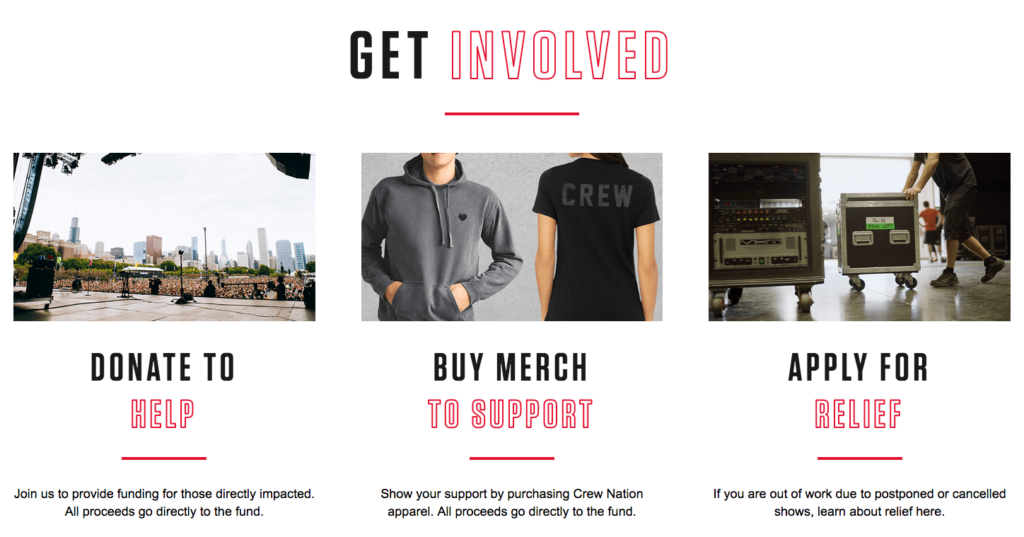The State of the Industry
How can WE Save Our Stages? #saveourstages
I think we can all AGREE – OVER IT!!!!
We are all missing LIVE music and moving onto NOV like a bitch…
I know it is like pouring salt in a wound and I don’t have to remind any of you that it’s has been nearly seven months since local and national venues shuttered their doors for the pandemic and the LIVE music stopped. The RONA wiped concerts and festivals off the calendar in March — but that was just the beginning.
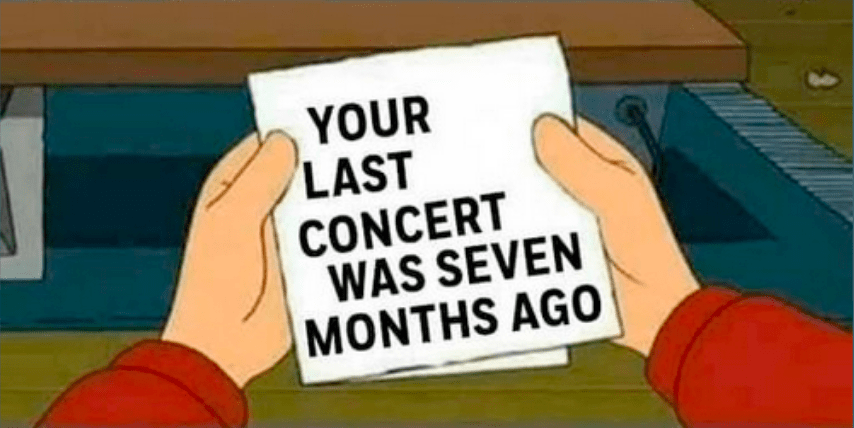
Before it all started, the music industry revenue has increased for two consecutive years. That’s the first time it’s happened since 1999, According to the RIAA and the projections for 2020 had a bullish outlook for amazing gains. Instead, companies are grappling with issuing refunds and lawsuits for contract cancelations.
The economic impact of the entertainment industry shuttering its doors for the entire year has created an unprecedented crisis for the music industry and for all the people who help run the machine. According to Pollstar, the live-music business was on track to generate $12.2 billion in box-office revenue in 2020, but one by one all the big festivals postponed and then canceled for 2020. Around the country big and small venues alike took heed to the CDC guidelines and all music venues remain closed due to the pandemic. Read the entire Pollstar article.
Our favorite artists have had huge losses
Everyone has heard the expression “Party like a ROCK STAR,” and we constantly see many of our favorite idols living up on TV and in the media but this year has significantly altered their earning potential and their income stream.
The social distancing restrictions have severely impacted scheduling LIVE music and the cash they generate. According to Live Nation, they have experienced a 98% year-on-year revenue decline in Q2 2020, driven by global concert shutdowns. Rumors from Live Nation management project that it maybe 2021 or 2022 before live music revenue from venues nationwide return to what they were before covid.
Most of our favorite artists have suffered major losses during the pandemic. Contrary to the idea that artists make a lot of money according to how many people listen to their music, the majority of an artist’s revenue comes from LIVE performances – touring, selling merchandise, licensing their music for things like streaming services, television, movies, or video games, and affiliate partnerships or side contracts.
With the end on crowd restrictions nowhere in sight, there is a huge uptick in artists LIVE streaming and many of the artists and companies who have been diversified and who had a digital plan are at least surviving or they are scrambling to come up with something now. As far as your favorite artists go – if you don’t already OWN their albums buy them, buy merch if you can – support them on social media, and definitely SWIM if they offer a paid LIVE STREAM. This may be the only way they can still afford their mansion and the private jet this year.
BEEM me UP!!!! PLEASE!!!!!!!!!
Inside music’s unprecedented crisis
As we take a look at the big picture losses, it is easy to focus on all those big numbers and the artists and companies in the music industry we recognize but those most deeply affected by these hard times are the behind the scene workers and employees. This unplanned hiatus has created a situation where many members of the music machine have been without any income for the duration of the lock-down.
The faces behind EVENTS – promoters, tour managers, touring crew members, musicians, tour directors, instrument technicians, lighting technicians, soundboard operators, tour merchandiser, VIP coordinator, production assistants, accountants, and festival vendors who are usually independent contractors, as opposed to salaried employees, are getting the shortest straw – their jobs simply no longer not exist without concerts and festivals. And due to red tape, some are either unable to qualify or they are ineligible to even apply for unemployment benefits. Many of these workers who made over the cut off amount for the work they did in 2019, also did not get in on the government stimulus checks, so they haven’t earned any money at all in 2020. Dire times indeed.
Making matters worse, there seems to be another spike in C-19 cases and even though restrictions in some states where starting to loosen – it doesn’t seem like the end of the venue closures is anywhere in sight.
Banding together to fight for survival
According to a National Independent Venue Association (NIVA) survey, 90 percent of independent venue owners, promoters, and show booking agents say that they will have to close permanently within the next few months if they don’t get help from some government funding. Pollstar estimates if venues end up shuttered through December, losses could spiral up to $8.9 billion losses in ticket sales alone – not including food and beverage revenues.
According to this article, “Venues Closing Across America: An Updating List (And Why It Matters)”
In the article they have created a running list of venue closings and from the look of it “the new normal” music scene is going to be lacking what were some of our country’s BEST.
In case you missed the stream from last weekend, (you can still watch – the Link is in the STREAM LIBRARY) NIVA partnered with YouTube for a 3-day virtual music festival to #SaveOurStages. This benefit event aimed to generate significant awareness, advocacy, and donations for the NIVA Emergency Relief Fund, directly supporting our most vulnerable venues experiencing catastrophic revenue loss.
The NIVA Emergency Relief Fund was launched to raise money for our most vulnerable venues, and keep them afloat while we wait on Congress. The fund will be administered by The Giving Back Fund; a separate non-profit that will collect the money and oversee the application process for venues to receive grants from the NIVA Emergency Relief Fund.
You can still donate now.
The Save Our Stages Act would establish a $10 billion grant program to provide at least six months of financial support to keep venues afloat, pay employees and preserve a critical economic sector for communities across America.
Despite the fact that the Save Our Stages has already been co-sponsored by more than 140 senators and representatives, independent venues across the country are still just to stay afloat while desperately awaiting federal assistance.
You can TAKE ACTION – Your voice matters — Tell your legislators to save independent music venues! Help us #SaveOurStages by telling Congress to ACT NOW! Here is the link to easily write to your legislators.
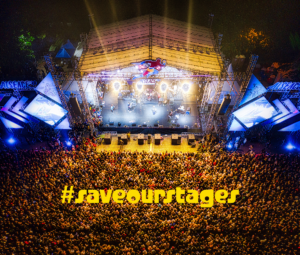
Congress has failed to ACT – The entire Music industry
and its people are in NEED!
This is the final push to Congress and there won’t be another opportunity. We NEED the #SaveOurStagesAct and the #RestartAct passed in order to keep independent venues nationwide from closing permanently. Please help us #SaveOurStages.
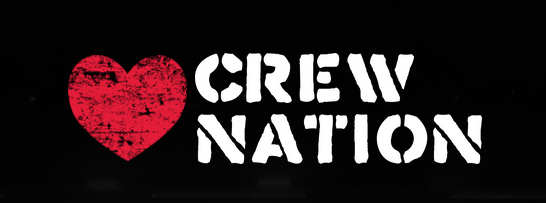
Live Nation has committed $10 million to Crew Nation – contributing an initial $5 million to the fund, then matching the next $5 million given by artists, fans, and employees dollar for dollar.
Crew Nation is powered by Music Forward Foundation, a charitable 501c3 organization, that will be administering the fund.

Get by with a little help…
While times are bleak for our country at large, if we look back to this time last year, for most of us not only was this “New Normal” something unexpected but also unplanned for, and many hard-working people are finding themselves in situations having trouble providing the basic needs for themselves and their family – something they never could have imagined before.
Struggling to find work, struggling to pay bills, struggling to pay rent…
For many, this may be the first time in their lifetime. Struggling mentally – which is a whole other article – As the politicians are throwing stones, many of our music industry workers are sadly ON their OWN and the only place for them to turn right now might be friends, family, and the local community. Getting help with basic needs, such as food and shelter, can reduce the stress of unemployment. Check out my list below with some of the resources I could find.
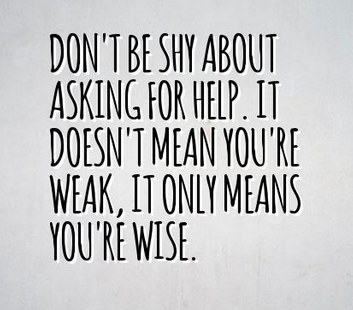
If you’re having trouble providing basic needs for yourself or your family and you need unemployment help, you can turn to many online community resources for assistance that are local to your area. For example, local, state, or government resources, such as a local food bank, may be available to help with meeting basic food needs. Check with local churches and local community organizations like RED CROSS for support. Also, if you call your area’s NON-EMERGENCY number, the local police department can often point you in the right direction to organizations in your local area. These organizations often have resources to help the unemployed with food baskets, donations, job help, and babysitting assistance.
Here is a list of 10 resources that may offer HELP:
- Call your credit card companies: Most credit card companies are offering some type of Covid-19 assistance, such as payment deferrals.
- Call your mortgage company: Most mortgage companies and banks are offering some type of Covid-19 assistance, such as payment deferrals or refi options. And through your local City government website, you can find more information on Emergency Rental Assistance.
- If you have Federal Student loans – the government-mandated Covid-19 assistance, such as payment deferrals, and low-income payment plans.
- Most energy companies are offering energy assistance programs if you can’t pay and most municipalities have cut-off restrictions.
- Here is the USDA website that offers information on SNAP and WIC which are two federal programs to help families in need get nutrition benefits to purchase healthy food. (Food Stamps)
- 2-1-1 Call Center: Call to find local assistance with training, employment, food pantries, affordable housing, and support groups.
- Low-Cost Phone Service: Reduced-cost phone service is available to eligible low-income families through the Lifeline program. Qualifying applicants can receive voice and data packages for less than $15 per month.
- Home Affordable Modification Program (AMP): This program, along with others, allows qualifying unemployed homeowners to reduce mortgage payments so that they can focus on finding a job without the pressure of foreclosure.
- Temporary Assistance for Needy Families: Each state has a Temporary Assistance for Needy Families (TANF) program, formerly called Aid to Families with Dependent Children (AFDC). TANF can help with food stamps, financial assistance, training, and job searching.
- Under the CARES ACT, if you have a 401 K, you may withdraw funds without penalties. Contact your fund management.

The future of the industry is hinging on WHEN things will open again and IF all of the festivals scheduled for 2021 can happen. There are already some big scheduling overlaps such as Bonnaroo moved, and now suddenly encroaching on Lost Lands and then also Austin City Limits the next weekend and so many others are still to be determined – One thing is for SURE – The 2021 FESTIVAL SEASON is going to be packed…if we get to mingle! The 2021 LIST is constantly being updated and I am adding new dates daily for your festival planning pleasure.
As uncertain as these times are, this too shall pass and hopefully, we will all be dancing in a field somewhere celebrating LIFE. Until, then CELEBRATE LIFE – Put on your favorite song and practice those dance moves because next year CELEBRATE we WILL!
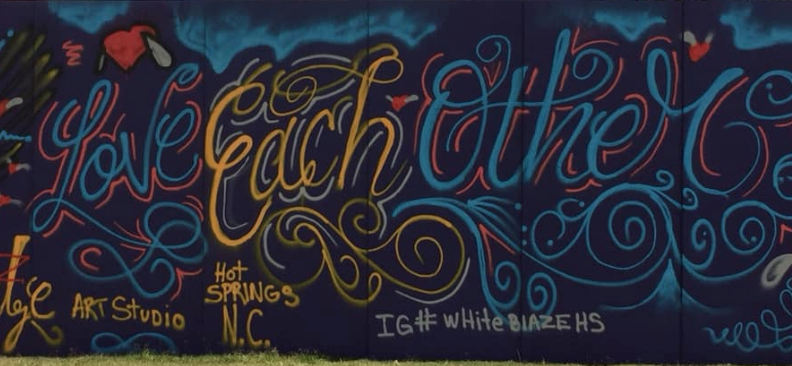
Be sure and like our page on FB, Instagram, Pinterest, and subscribe to our YouTube for festival updates, new articles, and more camping music festival gear tips!
Take care Festival Fam, HOPE to see you soon! ~WREN


